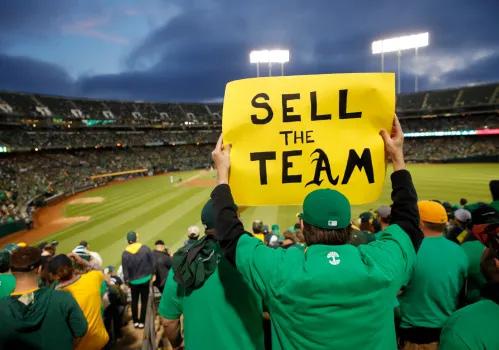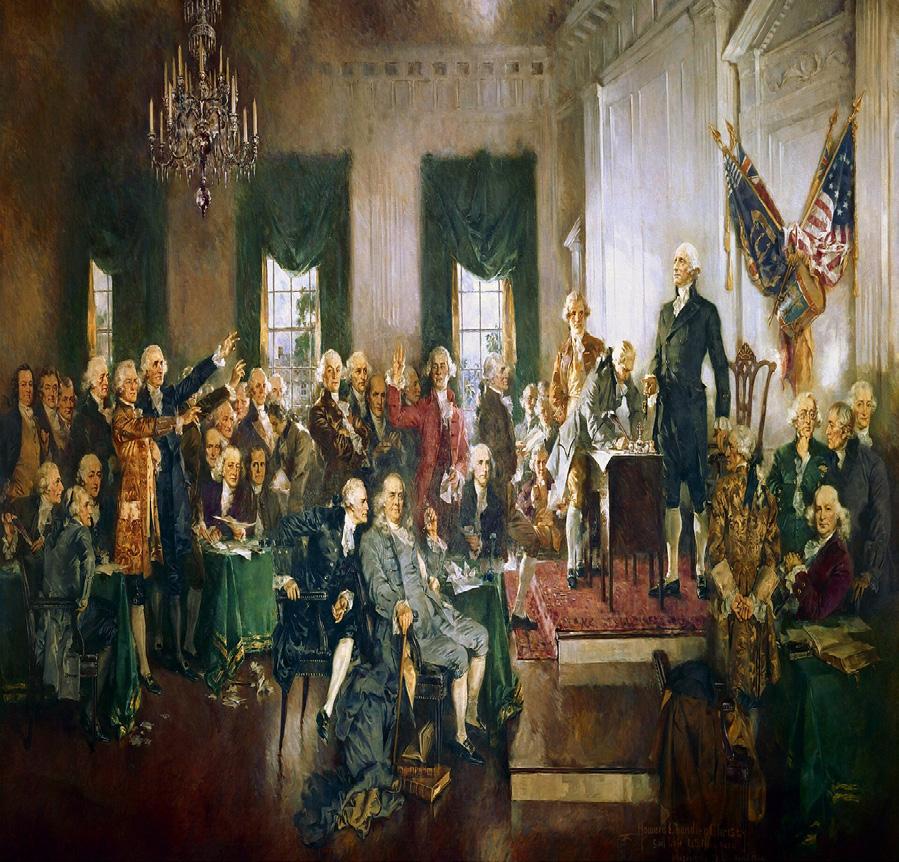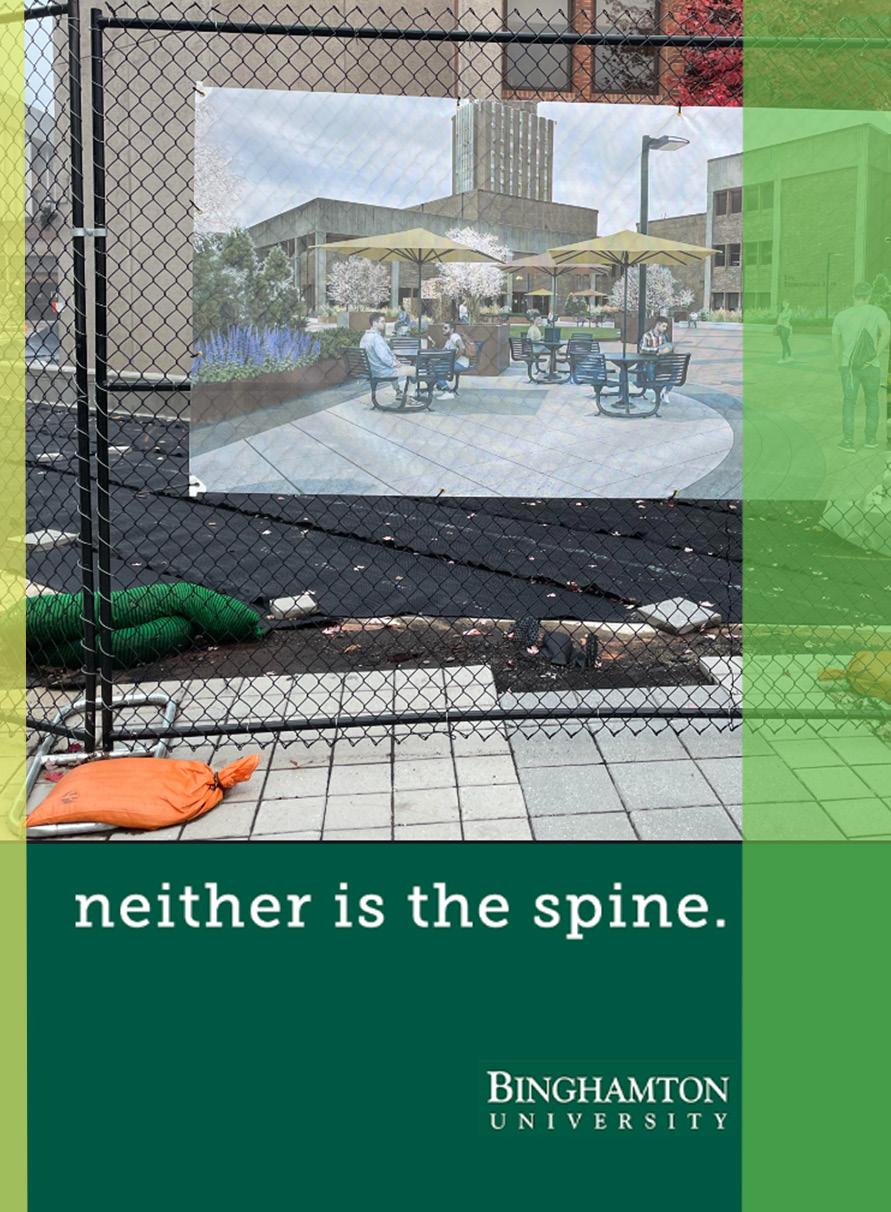

BINGHAMTON REVIEW
Copy
Midas
Business
Cover

Dear Readers,
Well,
well, well. Look who came crawling back… Another year of this. Anyway, welcome back to another year of the Binghamton Review, the magazine of all time. As we return to school, it’s always important to do a brief retrospective on what’s going on in Binghamton and introduce all the “freshies” to everything that makes Binghamton, well… Binghamton! As new and returning students travel to campus, you’ll see the elephant in the room, or the elephant that trampled the room. In simple terms, the campus is gone, torn to bits by construction workers fixated on collecting paychecks and playing Candy Crush. In an attempt to “improve student life,” the university has undergone a full-blown transformation. A Panera is being erected, the pavers are being ripped from the ground, and a BRAND NEW LECTURE HALL is under construction! The university’s administration has improved student life so much that they closed most of the walking paths on campus and somehow managed to make the parking situation even worse! Binghamton University? More like Construction University, amiright?!? (crowd erupts).
Now enough harping on that dang construction! That won’t get us anywhere (unless you write for us, that’ll make you a career!). Recently, it was announced that the university received a record number of applicants for the 25-26 school year! You know what that means! Taking a two-person dorm room and making it a FOUR-person dorm room. Student life has never been better!
Now, listen closely, Binghamton isn’t entirely a hellscape. Many things go on here that are good: The Pisser, The Pisser, the pisser… No, but seriously, Binghamton may seem like a construction and logistical hellhole because it is. HOWEVER, you can make Binghamton and your college experience what you want it to be. Go out with your friends downtown, have a matcha latte, read feminist literature, wear wired headphones, carry a tote bag, and just live life to your fullest. Enjoy the ride that college takes you on. There’ll be many highs and lows (the winter), but in the end, the time will fly fast, and you’ll miss it. So thank you to all our returning readers, our new readers, and are future readers who haven’t even been born yet. I
P.S. CHECK OUT OUR NEW WEBSITE BINGHAMTONREVIEW.ORG
Sincerely,

Aiden Miller

Our Mission

Binghamton Review is a non-partisan, student-run news magazine founded in 1987 at Binghamton University. A true liberal arts education expands a student’s horizons and opens one’s mind to a vast array of divergent perspectives. The mark of true maturity is being able to engage with these perspectives rationally while maintaining one’s own convictions. In that spirit, we seek to promote the free and open exchange of ideas and offer alternative viewpoints not normally found on campus. We stand against dogma in all of its forms, both on campus and beyond. We believe in the tenents of free expression and believe all sudents should have a voice on campus to convey their thoughts. Finally, we understand that mutual respect is a necessary component of any prosperous society. We strive to inform, engage with, and perhaps even amuse our readers in carrying out this mission.
Views expressed by writers do not necessarily represent the views of the publication as a whole.
ABC’s of Binghamton
Abstinence: what you’ll be practicing throughout your 4 years here (or 5 if you’re lucky)
BGinghamton Bookstore: Its entire business model is students being sick and not having enough energy to go all the way to Walmart.
Construction: the new virus spreading across campus now that COVID is over
Dilinger’s: the bar with a surprising lack of college students
East Gym: where every 2 microseconds someone is asking to work in with you
Fent Fold: what the locals do on the street
Written by our Staff
rove, The: where obvious freshmen flood in without being checked for ID
Hell’s seven circles: Tully’s, CopperTop, Shake Smart, Nirchi’s, the Vestal Parkway McDonald’s, Jimmy’s, and the Hungry Bearcat
International politics: something people with 15 unfinished assignments won’t shut up about
JUSTICE FOR THE UNCHARTERED CLUBS! GIVE US OUR FUNDING NOOOOOOOOOWWWWWW
Ketamine
Library Genesis (libgen): the closest thing we have to a wealth redistribution, followed shortly by Z-Library and Anna’s Archive
Morning classes: followed only by evening classes so you have a big awkward break in between classes. Also I guess we doin’ :15s and :45s now
No internet, secured
Ozempic
Pisser. The Binghamton Pisser.
Q: He forgot to confirm his enrollment before the deadline, making him tonight’s big loser
Tully’s: the Chum Bucket of campus
UFest: where you sign up for 15 clubs and stick with 0 of them
Visions Credit Union: When you sign up for them as a freshman, you get $25 free!
Weis Markets: better prices than Target and RIGHT across the road from it (also there’s a nice bar next to it)
X, Project: the best night of every freshman’s life, apparently. They have a low bar.
Record Admissions: If we remove just one more desk we can fit another freshman in this double!
Yik Yak: full of cancel culture, hookups, and brazen requests for drugs
Shots fired in Johnson City, says your B-Alert text message every month or so
Zingers: what this magazine is full of
How I Would Make Binghamton Great Again
Over the past four years, I’ve had the pleasure of blaming the university’s President Harvey R. Stenger IV for everything that goes wrong. Construction blocking my way to class? Thanks, Harvey! The price of the dining hall food went up? Thanks, Harvey! Failed a class because I forgot to take “Sure, here’s a 1500-word essay” out of my final submission? Why would Stenger do this?
“Accusations like “Anne did 9/11” because they just don’t roll off the tongue as well.”
But this mysterious yet easily blameable Stenger guy is soon to be gone. Not only has he chosen to step down, but the University has already found a replacement for him in the gender- and art-history-obsessed Anne D’Alleva. With this sudden power shift, I predict that absolutely nothing will change in terms of how this school is run. The new president will simply continue Harvey’s tradition of getting wasted in the Binghamton Oval Office every day instead of doing anything (note his membership in Alpha Sigma Phi). At most, we’ll have to abandon policy proposals like the “D’Alleva-mandated spouse” or accusations like “Anne did 9/11” because they just don’t roll off the tongue as well.
After many long, long sessions of pondering this fact, I came to a revelation. The only way this school could possibly improve is if I were the new president instead. The Premier Public Ivy does not need the leadership of a party-throwing frat boy or a word-salad-spewing feminist, but an outsider like me who can drain the Nature Preserve and actually get shit done. Allow me to elaborate on how I’d be spreading my genius across campus, and by the end of this article, you’ll all be voting for me in 2028 (that’s totally how it works, trust me).
“If the bus is full and some dickhead is taking up two seats with his bag, well, that’s your bag now, and he’s getting Brian’d.”
My very first order of business would be to impose a socialist-style price cap on all the stuff from the Binghamton Bookstore. Listen, the merch on the top floor is fine as hell, I agree. But NINETY DOLLARS? No wonder so many people are walking around campus looking like slobs (me included). I believe that drip is a human right, and as such, each piece of clothing shall be $10 at most. And don’t think I wouldn’t mention the school supplies, including the $15 notebooks and $10 pencils that put Nintendo’s price gouging to shame. Nah, with me in charge, the only thing distinguishing the bookstore from
By Angelo DiTocco
Walmart will be the average IQ. And if the dining halls keep acting up, I might have to put price caps on them as well.

Next, I’ll legalize theft and violence across campus—but the right kind. For example, if the knucklehead in front of you is buying two trays worth of food and his meal card gets fucking DECLINED, you’re legally allowed to spill your soda all over him and walk past the register with your other soda. If the bus is full and some dickhead is taking up two seats with his bag, well, that’s your bag now, and he’s getting Brian’d if you know what I mean. To make sure this is all fair, we’ll gut the HR building (clankers will take their jobs anyway) and turn it into a courthouse where witnesses can testify against all the assholery they encounter on campus. Soon enough, the university’s status as a top dog will finally start to reflect in the behavior of its students.
To address more current issues, I’ll divert the construction teams to work on things that actually matter. The East Gym addition is cool and all, but it’s still hella far away from where anyone lives. Instead of some silly little sportsball field, why not have a weight room in the middle of every living community? And why are we building a Panera Bread when we already have our own mediocre, overpriced breakfast place that’s open 3 days a week? We need a WING PLACE, people! That would bring the university MILLIONS in revenue! Maybe even billions. And instead of putting down some stupid little tiles by the library that will crack in two days, let’s instead build sidewalks next to the roads that don’t even have them.
Lastly, no administration is complete without foreign policy, and I’ll be sure to make changes in that field as well. I’ll use my excellent social skills to sweet-talk Binghamton into some of the best trade deals it has ever seen, building bridges with companies that don’t suck. I’ll replace Brightspace with Google Classroom and Pepsi with Coke, to name a few.
These are just some of the policies I would implement to make Binghamton the best, brightest, and most civilized university in the country. Let’s hope this new president has some ideas in common with me. Otherwise, we might be due for a re-enactment of a certain protest from 4 years ago.
Life After Binghamton
By Logan Blakeslee
Dear
Gentle Readers,
I write to you as a phantom alumnus from the comfort of my staff desk in the U.S. House of Representatives. It has been almost one full year since I grabbed that overpriced certificate, shook Harvey’s hand, and threw my cap in the air. Lately, I’ve been feeling nostalgic for my wistful college days, remembering the joys of not having to pay rent or cranking out high-quality articles with the boys at the Review. I miss those days.
So, after stating that my last article would be my very last, what suddenly brought me back? My personal theory is homesickness. Shortly after graduation, I managed to travel the world and see many incredible things, some of which I may dedicate other articles to. I lived in Kyrgyzstan and ventured out into the glamorous city of Dubai (where I watched the 2024 election results roll in), only to then endure a brutal winter in Toronto, Canada. To this day, Canada remains the very worst country I have ever been to. 0/10, would not recommend.
“Being flexible is an asset, but if you haveno plan, then you are going to waste precious time searching for a job against thousands of competitors.”
Returning to the United States, I found temporary employment in Arlington, Virginia, but soon faced temporary homelessness in Ithaca, New York. I found myself wandering from place to place, searching for shelter and work like a 1930s vagrant. The only difference is that I have a car. Hundreds of job applications went out on websites like Glassdoor, LinkedIn, and Handshake, but I was met with endless rejections or just eerie silence. As a conservative, I am not afraid of pulling myself up by the bootstraps and working hard, but what does one do when there is no work?

Some of my honorable peers returned to college to get a master’s degree, and I considered that option as well. When every job wants 5+ years of experience and an advanced degree yet barely pays above minimum wage, what is anyone supposed to do? Use AI to lie on job applications? Join the gig economy? Start my own cryptocurrency Ponzi scheme? The answer yet eludes me. I suppose I could sell YuGi-Oh cards online…

Anyways, I got very lucky when I was accepted for an internship in the U.S. Capitol Building. It felt amazing to put my poli-sci skills to use on the federal level, restoring my confidence at a time when I needed it most. However, at the time of this article’s writing, my internship ends tomorrow. Soon, I will be back on the hunt for a real, full-time job. My personal debts have ballooned recently, and my next step forward is a mystery.
So, why bother writing any of this? Part of it boils down to my desire not to see future graduates end up like I did. If you are a senior or recent graduate, it is imperative that you think long and hard about your career path. Being flexible is an asset, but if you have no plan, then you are going to waste precious time searching for a job against thousands of competitors. I might even be one of them. That said, not all hope is lost.
Living in Washington D.C. taught me that personal connections are far more valuable than almost anything else when job hunting. Networking will get you the attention that academic credentials won’t. Be keen to make yourself visible to employers that you or a loved one may know personally. Don’t get discouraged just because your favorite think tank turned you down; there are plenty of fish in the sea. Keep moving forward, and remember that your friends will struggle alongside you, so don’t be shy to ask for help. Lastly, don’t be too proud to help others once you reach your destination.
That’s all for now, my next article will be more optimistic. I promise.
Duolingo Sux: A Pedagogical and Linguistic Evaluation
Iam an estranged ex of Duolingo. For the longest time (starting in 2021), I used Duolingo daily to study multiple languages, such as Danish, German, the occasional Hindi, but most prominently, Dutch. Don’t be fooled – I was no casual user. I racked up an outstanding ONE THOUSAND days before I decided it was time to quit. I even completed the course for Dutch.
Despite the unacceptable amount of time I’ve spent studying, I froze up whenever I was asked to say anything in the language. It was the strangest feeling; I knew that I had all the words in my head, but for some reason, I couldn’t produce them into speech.
But whatever, times have changed. I quit the app, grew up, put on my college pants, and decided to minor in German at this godforsaken university. Within only two semesters of real, in-person German courses, I noticed that my proficiency was significantly better than that of my three years’ worth of Dutch. I could actually converse in German if needed. I can only ask, why is that?
Language learning apps miss a crucial component of actual acquisition of the language – communication with others. Similar to your dreaded high school Spanish classes, these apps are input, input, input. Memorize these bits of vocabulary. Learn this sound. Remember to conjugate that word with this pronoun. Don’t forget the umlaut over the “o.” Of course, it’s a tedious yet necessary process to learn phonics and your run-ofthe-mill vocabulary.
In the field of Second Language Acquisition (SLA), the theory, “Present, Practice, Produce” (PPP) proposes that effective language instruction includes the learner being presented with grammar rules or vocabulary, practicing them (filling the blank, simple conjugations, etc.), and producing them in, optimally, unscripted writing or conversation. Production mostly takes place with an open-ended prompt, such as “What did you do yesterday?” or “How would you describe the perfect home?” combined with another condition, e.g., use more adjectives or a specific set of verbs.
“‘I keep hearing the voices,’ ‘The apple speaks English,’ and ‘The pieces of onion revolted.’”
Duolingo utilizes only the first two steps in the structure of the courses. A user will be presented with new vocabulary in familiar sentences, and will practice recognizing that word by translating sentences from their target language into their first. Never once does the app ask the user to utilize that word in an unscripted sentence.
Not producing vocabulary isn’t as detrimental as not producing grammar. Initially, Duolingo rarely describes a grammar rule prior to the user practicing that structure. Knowing and/
By Broom Bremner
or memorizing grammar rules is not the most important thing when it comes to learning a language, but it surely has its benefits. Anyone who has studied a Germanic language knows that the word order in subjunctive clauses can be pretty confusing and difficult to grasp. When studying Dutch, Duolingo never described that a verb in the subjunctive goes at the end of the sentence, let alone what the subjunctive even was. I was left guessing the sentence structure in every translation exercise. At this point, you know the words, you have concepts of a plan to use the grammar, and you think you’re ready to speak to somebody. I already told you how this story goes. You struggle to speak every sentence, having never needed to produce anything on your own. Speaking is a skill that requires practice. That’s what makes classes (high school EXCLUDED) taught by language professionals so effective. My German

classes are 90% interviews/talking with someone near you. It’s an introvert’s nightmare, but it significantly assists your knowledge of grammar and vocabulary to transition into automatic conversational skills. It doesn’t matter what my partner and I talk about, as long as we’re practicing speaking German. Duolingo receives a bunch of attention online due to its wacky little sentences that the users translate in lessons. Some of the ones I remember along the way are “I keep hearing the voices,” “The apple speaks English,” and “The pieces of onion revolted.” Honestly, it’s a great marketing strategy. People are more interested in using Duolingo or language learning in general when they see how fun the experience can be. But… practically? What are you supposed to do with these sentences? Maybe they are just a fun way of practicing past tense, conjugations, adjective endings, etc., since the actual noun in this case doesn’t matter. But when users are attempting to practically use their knowledge of the language, what they retain the most are the strange sentences they saw, rather than the boring ones. Personally, gun to my head, I could not tell you how to say, “the
politician really cared for the country and the people in it,” in Dutch, but I could damn well say, “de beer eet mijn dochter.” So, yeah, take that.
After about a month of using Duolingo (not even, really), my motivation was on the decline, and it’s not for no reason. Apps tend to use a monotonous structure for their lessons; it’s extremely boring to translate sentences over and over again, and Duolingo’s strange-sentence bit gets old after a couple of lessons.
“Implying that you must do your Spanish lessons or else the green rat will snatch you up.”
I realize that this issue is not specific to me, but is a common issue among the users of language apps. In response, developers use this fancy-sounding strategy called “gamification.” Essentially, the apps combine language learning with fun little games, leaderboards, experience points, and daily streaks (eugh). These additions improve the retention of users (it definitely kept me for a while), but I doubt that gamification retains the user’s interest in learning the language.
Keeping up with the Duolingo train, the app’s daily streak feature is effective for about…two weeks? Unless you have an external reason to learn (vacation, friends) or you have an abnormally strong desire to learn a second language, the daily streak feature is what keeps you coming back for more. It’s gratifying to see that number tick up just one more day. But as motivation declines, the amount of effort one puts into continuing their daily streak does as well.
For context, most language apps require their users to set daily goals, whether that be five minutes, ten minutes, or so on. You’ll initially set it to ten minutes, because five seems like too little and twenty too much. But when your “learning” focuses more on extending your streak rather than progressing through the course, you decrease your daily goal to five minutes to get it done as quickly as possible. On top of that, you’ll go back to the introduction and complete the lessons that take the least amount of brain power to complete, rather than the next step. The same applies to leaderboards and experience points.
Don’t even get me started on the notifications (I will). Another marketing strategy that Duolingo uses is its system of overly threatening notifications. I’m sure most of you have

heard the phrase “Spanish or vanish,” implying that you must do your Spanish lessons or else the green rat will snatch you up (and whatever else it wants). If you are proactive enough to add a widget to your phone’s homescreen, the owl gets progressively angrier the longer you wait to do your lesson. When approaching the late hours of the night, the “thing” is engulfed in flames. I assume these flames are not from the bird’s anger, but are the flames of hell in which you’ll soon be entering.
Similar to the other gamification strategies, the notifications were not all that effective in keeping me and other users interested in learning a second language. At the end of the day, I could not be bothered. Couldn’t care less, really.
Apps like these require an insane amount of self-discipline and sticking to routines. Using apps independently will have you groaning when it is 11:20 PM and you’ve forgotten (once again) to practice your ten minutes (soon five) for the day. It’s not even that hard to dedicate ten minutes a day to learning a language, but combined with the simple and boring lessons, it feels like more than a chore.
This is where, once again, the classroom takes the W. Instructed learning in the classroom setting sets external rules, such as deadlines and grades. You may not want to do your Spanish homework for tomorrow, but you do it anyway, knowing that your assignment will be checked, graded, and used as practice for the next class.
As much as I’ve been shitting on them, Duolingo, among other language apps, can be beneficial for a learner. In fact, regular and motivated use of technological instruction tends to improve knowledge in grammar and vocabulary. Speaking and writing, as I ranted before, do not see the same effect due to the lack of production. So, in conclusion, language learning apps should be used as supplements for learning, and not just alone. You need to speak and write unscripted. Trust.


Shades of Green and Gold: Ownership in Pro Sports
In the world of professional sports, a city’s team can often be a source of pride and passion for those who live there. In some cases, the team’s logo can even be interpreted as a logo for the city itself, an example being the Yankees’ crossing “NY” often interpreted internationally as a logo for the city itself. While sports teams are often perceived as a public entity within a city, in the end, they are purely a business, operated to make as much money as possible. Oftentimes, the success of a team is heavily impacted by the team’s ownership, with this being most clear within Major League Baseball (MLB). The most recent and egregious example of this is the owner of the Athletics, John Fisher.
“Ultimately, these teams’ failures are being caused by either extremely cheap or incompetent owners.”
In late 2023, it was announced that the Oakland Athletics were moving to Las Vegas in the near future, once a stadium had been built for them. This announcement was met with extreme backlash from fans in Oakland, prompting numerous “Sell the Team” protests throughout the 2024 MLB Season. In these protests, Fisher was accused of purposely running the team into the ground after not receiving public funding from the City of Oakland to build a new stadium, making a move to Las Vegas (a city where Fisher is receiving public funding) look more attractive to the MLB and other MLB owners. After all, Oakland is a small city in a crowded media market; what reason would they have to stay? Fans in Oakland were desperately clinging to keeping their team, but with their owner being John Fisher, this was proven to be impossible.

On the complete other end of this spectrum are the Green Bay Packers, an NFL team based in Wisconsin. The Packers are stand-alone in all of U.S professional sports in that they are entirely owned by their fans. You can straight-up pay for Packers stock and become a partial owner of the team—but there’s a caveat. The Packers’ stock isn’t sellable, and the profits made by
By Matthew Newman
the team are directly invested back into the team, generating no money for the owners themselves. You get nothing tangible out of becoming an owner besides a framed certificate saying you are part of the team. So why would anyone actually want to buy Packers stock?

As illustrated earlier, sports fans can be extremely dedicated, willing to fight for and argue for their team, often out of city or state pride. Green Bay’s ownership model allows them to literally shape the future of their team, with numerous improvements to Lambeau Field (the oldest stadium in the NFL) being funded directly through the sale of team stock. This is a stark contrast from teams threatening to move to different cities if they don’t receive money from already stretched-thin state/city budgets. Even though Green Bay is a significantly smaller city and media market compared to other professional sports teams, the team is able to stay relevant and in Green Bay due to the support from loyal fans.
With Green Bay having so much success using this ownership model, I personally believe that professional sports in the U.S would benefit significantly from adopting a similar approach. In the MLB alone, there is no shortage of franchises where their success is often determined by the quality of their owner: the 2024 Chicago White Sox 41-121 win-loss record, the inability for the Pittsburgh Pirates to capitalize on generational pitching talent (Paul Skenes), the L.A. Angels having two MVPs (Mike Trout and Shohei Ohtani) on their roster and still being unable to make the playoffs, and the consistent joke that are the 2025 Colorado Rockies.
Ultimately, these teams’ failures are being caused by either extremely cheap or incompetent owners, supporting the idea that bad ownership isn’t an Athletics problem; it’s a league-wide problem. Ultimately, it’s unlikely to see more professional sports teams become fan-owned (the NFL even banned the process from ever happening again outside of the Packers), but I still do believe that the Packers demonstrate how to correctly run a professional team, directly in contrast with the extreme amounts of greed and carelessness exhibited by owners like Fisher.
When Law Becomes Scripture
By Comson Cao
In American politics, especially among conservatives, reverence for the U.S. Constitution often borders on religious devotion. The founding document is treated not just as law, but as sacred scripture: perfect in design, timeless in wisdom, and beyond serious critique. But this kind of constitutional worship is deeply flawed. A constitution is a political tool, not divine revelation. Moreover, a constitution merely describes legality and does not by any means prescribe morality. Laws describe what is permitted or forbidden within a given system. Morality asks what is just or unjust regardless of the system. If we are serious about politics, then constitutional devotion is not enough. The question is not whether an action is constitutional, but whether it is just, beneficial, and sustainable for the society we live in now. Constitutions can provide structure, but they cannot substitute for moral and practical judgment.
“No society assumes it got the formula right on the first try, except, apparently, America.”
Supporters of the Constitution are quick to denounce slavery as a moral evil based on current modern sensibilities, but this was legally tolerated by the American Constitution from the country’s inception all the way until emancipation, and indeed, when it came to the Confederate Constitution, it was explicitly ingrained as a right. One can retort that the founding fathers had conflicted views on slavery, but such a retort is not only short-sighted, but actually hurting their position even more. After all, how can one treat a legal system as sacred when its designers couldn’t even agree upon the design? The problem runs deeper than slavery or any single example, however. The very first political party of the United States, the Federalists, consisted substantially of Anglophiles, many of whom even admired the British monarchist system; Alexander Hamilton openly mused about life tenure for executives. America today bears little resemblance to what many of them envisioned. If fidelity to constitutionalism means fidelity to the framers’ world, then its defenders must 1) explain which framer’s world they are defending exactly, and 2) grapple with the fact that America has already left all of those worlds behind. If, instead, constitutionalism means fidelity to the text regardless of morality, then its defenders are left with absurd conclusions. Consider a hypothetical: Imagine a new breakaway state ruled by a despot. Its founding charter openly authorizes dictatorship, placing all
powers in his hands. Would anyone argue that dictatorship is therefore just, merely because it is constitutional? Alternatively, picture a constitution that formally permitted lynchings for petty insults or name-calling. Should one uphold this because “the law allows it”? Such a proposition would likely be hard to swallow for most people who indulge in the current Western sensibilities.

The conservative pushback to this is predictable: sure, laws are imperfect, and not all constitutions are equally sensible, but it just so happens that America’s is exceptional. After all, constitutional worship survives only if you assume that the American Constitution is uniquely different—that unlike every other founding document in history, it somehow got everything right. This is the heart of American exceptionalism: the belief that the founding generation produced a document so wise, so flawless, that it transcends ordinary history. But this is not an argument; it is an article of faith. There is no way to “test” constitutional perfection, and history itself suggests a rather murky track record. Consider Liberia. Established by repatriated freedmen resettled from the United States with the help of the American Colonization Society, its framers modeled their constitution directly on America’s. Yet the country has endured coups, civil wars, endemic poverty, and entrenched corruption. Its struggles are indistinguishable from those of its West African neighbors who had no American-inspired “blessing of liberty.” Of course, this on its own doesn’t mean the U.S. Constitution is defective, but success is not guaranteed by parchment alone. America is barely two and a half centuries old—an adolescent in civilizational terms. Compare this to its mother country of England, whose political system has evolved through revolutions, monarchies, and parliamentary reforms, or China, whose civilizational history has lasted for multiple millennia. Both have rewritten their frameworks repeatedly. Meanwhile, France is already on its fifth republic. No society assumes it got the formula right on the first try, except, apparently, America. From the perspective of serious historians, then, constitutional worship looks less like patriotism and more like delusion. What makes the conservative worship of the Constitution even more egregious is that the way it is applied often depends entirely on their own ideological preferences. At the nation’s founding, the Bill of Rights bound only the federal government. States were free to curtail speech, establish official churches, or outlaw dissent without violating the Constitution. Barron v. Baltimore (1833) made this explicit: the Constitution’s guarantees did not apply to state governments. Southern legislatures
criminalized abolitionist speech, northern states maintained religious establishments into the nineteenth century, and none of this was unconstitutional. It was not until after the Civil War, with the ratification of the Fourteenth Amendment, that a legal basis even existed to extend those rights against the states. Through what is now called the “Incorporation Doctrine”, the Supreme Court began—case by case—“selectively incorporating” provisions of the Bill of Rights into state law. Freedom of speech against state laws was recognized in 1925 (Gitlow v. New York), the right to counsel in 1963 (Gideon v. Wainwright), and the Second Amendment not until 2010 (McDonald v. Chicago). In other words, much of what conservatives today claim as timeless, original “constitutional truths” are in fact the product of post-Civil War judicial reinterpretation. Their cherished rights were not guarantees legalized during the founding of the nation, but relatively recent innovations, often imposed topdown by the Supreme Court. To accept, for example, that a liberal state’s gun laws are “unconstitutional,” one must also accept the legitimacy of the Incorporation Doctrine—an interpretive shift made possible only by post-Civil War amendments and modern judicial reasoning. You can’t both reject “judicial activism” and rely on it to apply your preferred rights nationwide. The notion that these rights have always existed as part of an
“The Constitution deserves respect as a remarkable product of its time, but respect is not the same as worship.”
unbroken, universal covenant is simply false.
With immigration accelerating the cultural and demographic changes of the country, it has become harder to define what an “American” means. The Constitution fills that void. For conservatives especially, it serves as the lowest common denominator, the one symbol that can unify people across divisions (and even then, it’s debatable whether foreigners actually respect that document), along with possibly sports games and eating slop. Reverence for it is less about political philosophy and more about identity, about holding together an empire’s multiple nations within its borders by rallying them around its founding text. Personally, I believe that’s the fundamental reason why the mythologization of the Constitution has become so pronounced among this side of the political aisle. Immigration also exposes the short-sightedness of American political discourse. Conservatives who want to abolish birthright citizenship must now fight over the “correct” interpretation of the Fourteenth Amendment. Whether or not that amendment truly enshrines jus soli or “right of soil” is, to me, beside the point. The problem is that once again, legality and morality are conflated: if the Constitution allows it, it must be righteous; if it forbids it, it must be wrong. But that is a distraction. The real question is what effects immigration has on the host society—economically, culturally, politically—and what policies follow from those effects. Immigration has never been static: its scale, sources, and impact have shifted throughout American history. A rational polity would adjust policy accordingly, without treating the decisions of past centuries as binding for all time. But there is a deeper irony here. After all, the American
Constitution was not written with today’s America in mind. Its authors envisioned a nation for white, primarily Anglo-Protestant, men. The very first citizenship law, passed by Congress in 1790, restricted naturalization to free white persons of good character. How can constitutionalism claim timeless authority when the very people it governs today were never its intended audience?
The Constitution deserves respect as a remarkable product of its time, but respect is not the same as worship. Morality and legality oftentimes overlap, but they are not synonymous, and the classification of something as legal or illegal does not answer if it should be that way. To treat the document as flawless is to confuse myth with truth. And to cling to it as a universal identity is to ignore that it was never written for the America that exists today, which has morphed into a completely different political entity over time, one that the apparently flawless and ever-wise Founders never foresaw when they wrote this allegedly perfect document. The danger is not that the Constitution will fail on its own terms, but rather that conservatives treat it as destiny. It is worth noting that even Chinese Legalism—which placed law at the center of politics—never treated law as timeless. To Legalists, the value of a law is in its efficacy in serving the state and enforceability, rather than treating it as some timeless perfection because of supposed mystical origins. Han Feizi explicitly warned rulers against worshipping the past. To copy the “ways of the ancients,” he argued, was folly, because each age faces different challenges. It is incredibly ironic that American conservatives are, in this sense, less pragmatic than a philosophy that literally elevated law above morality itself. Dogmatic worship makes reforms increasingly difficult to achieve when they are needed. Truly exceptional countries adapt and always look forward, innovating and evolving to whatever challenges modernity and the future throws at them. By contrast, a country which is eternally stuck in the past is a stagnant country that will be left behind in the dustbins of history.

Why Epstein Should Never Go Away
The Godfather II is one of the greatest movies in cinematic history, partly due to its dynamic storytelling. In the film, Senator Geary of Nevada had opposed the Corleone family’s business ventures in his state, making it difficult for their casinos to obtain gaming licenses. To get what they want, the mafia captures a photograph of the senator lying in bed with a dead prostitute, blackmailing him firmly in their pocket. If life imitates art, then we have strong reason to believe Jeffrey Epstein was doing the same thing, blackmailing elites with his trafficking of minors. FBI agents found hidden cameras during the 2019 raid on his townhouse, butlers have claimed knowledge of extensive surveillance systems in his guest rooms, and victims claim cameras in Epstein’s homes were connected to a network. It is clear these videos and files exist, and Americans want to know where the files are and what Epstein used them for.
Many Americans were confused as to how the Department of Justice could deny the existence of files on Jeffrey Epstein in July when Attorney General Pam Bondi alluded to their existence in February. She claimed the files (specifically the client list) were sitting on her desk. The questions in the video the DOJ released from the Manhattan penitentiary the night of Epstein’s death also raised eyebrows; we were told the cameras were not working that night, only to then get a video from a random angle with a missing minute, which metadata shows to be likely edited. Keep in mind, Epstein’s death was ruled a “suicide” by a doctor who had not performed the autopsy on Epstein. Dr. Michael Baden, who was personally in the autopsy room as an observer, came away with the conclusion of homicide. None of this satisfied the public, but the continued conversation has not satisfied President Trump. He came out swinging with comments like, “Are people still talking about this creep [Epstein],” spinning the Epstein case into another “Democratic hoax,” and disavowing Republicans still asking about Epstein. This extreme gaslighting is wrong, and President Trump’s feet need to be held to the fire so we get answers.
The ways Epstein obtained his wealth are really quite mysterious. Epstein worked at the Bear Stearns firm, from which he was dismissed for regulatory violations. According to former business partner Steven Hoffman, Epstein was a fixer who helped move money around without arousing suspicion. In fact, Hoffman was introduced to Jeffrey Epstein by Douglas Leese, an arms mover and fixer himself. Yet all of that doesn’t explain how Epstein obtained billionaire status, a private island, his own jet, and lavish properties in Manhattan, New Mexico, and Palm Beach. This is compounded by other relevant questions regarding Epstein’s finances. Why did Leon Black pay Epstein $158 million? Was he worth that much for “being a fixer” who helped Black avoid taxes? Why did Les Wexner, founder of brands such as Victoria’s Secret, Bath & Body Works, and Abercrombie & Fitch, give Epstein power of attorney over his
By Nicholas Aparicio
billion-dollar estate? Were they blackmailed? Or was it to support him on his missions to serve an entity?
There has been great evidence that Epstein had surveillance systems within his properties. It’s clear he was after blackmail. He hung around with very important people, the most deeply implicated ones being Bill Gates, Bill Clinton, Donald Trump, Prince Andrew, Bill Richardson, Larry Summers, Jes Staley, and Alan Dershowitz. Epstein was likely blackmailing powerful men who had sex with underage girls he trafficked (not all the aforementioned men are guilty). Given the level of sophistication, his inexplicable wealth, and the level of powerful men, it was possibly on the behalf of another entity.
The most floated option is the government of Israel. This isn’t a fringe theory; it’s one heavily circulated and has even found its way to the stage of TPUSA via Tucker Carlson. Epstein started off as a fixer, moving money for the ultra-wealthy and for countries. Epstein’s co-conspirator, Ghislaine Maxwell, was the daughter of Robert Maxwell, a news magnate who had very strong ties to Israel, even receiving a state funeral there. Ehud Barak, former Prime Minister of Israel, visited Epstein’s Manhattan home on a few occasions and had business dealings with him. Epstein visited Israel multiple times, most notably during the 2006-2008 timeframe of his plea deal negotiations. That plea deal with the Southern District of Florida was so rushed and widely criticized that it was overturned in 2019 for violating victim confidentiality laws. The DA in that case, Alex Acosta, is rumored to have testified on Capitol Hill that he was informed Epstein was “intelligence”. Even the aforementioned Les Wexner is a known Zionist who supports all sorts of pro-Israel causes. It is not out of the realm of possibility that he served Israel by feeding them embarrassing videos of American politicians and billionaires to get them firmly on Israel’s side in international issues. This isn’t an anti-semitic conspiracy; it’s something worth investigating to reach the truth.
That is the bottom line with the whole Epstein situation. This man had ties to countless people. He was America’s most notorious pedophile, and the fact that he might’ve been committing crimes on behalf of another country (Israel or not) is sickening. President Trump continuing to obstruct and distract from the truth is pathetic and makes him complicit. This is about demanding answers and holding our most powerful accountable. Epstein was a monster who tried to equate his proclivities for young women with homosexuality. Jeffrey Epstein’s associates and enablers deserve no mercy or protection from embarrassment and/or prosecution, which releasing files might bring. President Trump’s belligerent rhetoric against the files is deeply unsettling to his voters. With the recent release of 30K+ files, hopefully, we will get real answers.
Give Us Employment
By Xinpeng Gao
Aweek before I was supposed to even move my belongings into Binghamton, I began to apply for jobs. There was $3000 included in my financial aid package, deemed “workstudy”, unused. If I saw a job with “federal work study” in the title on Handshake, I immediately applied—it shouldn’t be this hard, right? Yet, three weeks later, I have only heard back for an interview for two of the thirty-three jobs I have applied for on Handshake. Don’t get me wrong, I am grateful to those employers for even merely considering me, but can someone explain to me why jobs involving plugging numbers into Excel spreadsheets seem harder to get than an internship at Google?
Every time I look further into the job description, it seems there is almost always one position available (I remember seeing only one job listing that had two positions to be filled). It’s almost as if in the entire campus, there is only one student who is qualified to carry the twenty-five pounds of chemistry lab supplies between the different science buildings. Wouldn’t it alleviate the responsibilities of that one student and the department hiring them if they just hired an additional person? These employers on Handshake are acting like all of the money from the federal government is coming out of their pockets—why can’t they just add more positions?
“I wonder if people would order more than just chicken and rice at the dining hall if they were actually employed.”
I’m planning to major in computer science. It’s a running joke that we’ll always be unemployed. Even back in high school, I could not go to a single alumni-speaker event without someone quipping about the “current job market for computer science majors”. However, I could never fathom that the job market for even the most menial work on campus is also nonexistent. These jobs are already funded, so I don’t understand why they are so competitive. I don’t think this is just my problem. My roommate, who is a physics major, has also applied to a plethora of jobs on Handshake, yet has heard back from zero for interviews.
I want you to picture the average Binghamton student’s bank account. With 46% of students receiving financial aid (BigFuture), there is no way it could be high at all. These jobs aren’t just nice to have, but for many students, they’re what will go towards supplementing stingy meal plans, expensive textbooks, and transportation back home. I wonder if people would order more than just chicken and rice at the dining hall if they were actually employed.
There’s also something about having a job that gives a reason for Binghamton students not to participate in social activities. I’ll admit there are a lot of community events that I didn’t feel like going to—Binghamton does have the “party school” reputation after all. Being in my dorm or library all day does
make me feel like an anti-social loser. But what if I were able to say, “Sorry, I have work right now”? Suddenly, I’d sound so productive.

Now, of course, I can look for jobs off-campus or even Sodexo (although I’ll admit I’m a little bit traumatized after seeing one of the student workers get berated by his supervisor and being threatened that they should take away his “work-study money” in front of a line). Commuter students exist; it would just be like commuting to Binghamton, but in reverse (Binghamton is my home).
I could spend this energy lobbying for a better meal plan or cheaper transit home, but I think the students of Binghamton deserve jobs—dignified, funded, available jobs. Work-study was promised. The Fleishman Career Center is great, but the university itself should be employing more students. As for the financial aid department, assisting students with getting scholarships is not enough. While they are great, how about creating new positions on campus so that they aren’t just a line on your FAFSA award letter? I’m even willing to offer free consulting on what possible listings on campus could be turned into a workstudy job.
But until then, I’ll keep refreshing Handshake —hoping for a new post, praying it’s a job.
Ruminations on Paul (2011) and Battleship Potemkin (1925)
By Adam Brukman
Isat down and watched the movie Paul around the start of August. I was with a longtime friend of mine, an occasionally awkward yet earnestly natured youth. I sat and sifted through Netflix’s lackluster catalog of movies. My friend sipped on his energy drink. Like two deer staring down the headlights of an oncoming automobile, my friend and I were struck with the glorious image of a crappy CGI Alien flipping the camera off. There was no other movie that looked nearly as appealing in that moment as Paul. We put the movie on without much deliberation. Paul, directed by Greg Mottola, follows a little grey alien named Paul. Paul, voiced by Seth Rogan, is guided by two British tourists back to his mothership, all while being hounded by comically incompetent FBI Agents. Paul eats a bird, a Christian lady has a crisis in faith, the FBI agents die in surprisingly gruesome manners, and Paul gets home safe and sound. Overall, the movie was forgettable, yet occasionally charming.
“Art and its consumption is as fundamental to the human experience as the process of eating, digestion, and defecation.”
At the tail end of that same August, I was bored and didn’t feel like doing my schoolwork. Instead, I sat down and watched the 1925 Soviet silent film Battleship Potemkin, directed by Sergei Eisenstein. The movie depicts the 1905 mutiny on the titular battleship Potemkin, and the subsequent fervor for revolution that the Russian mutineers inspire in nearby Odessa. When the powers that be send over some more battleships to quash the rebellion, the sailors are ultimately spared from turretfire due to the unifying power of their camaraderie. I quite liked Battleship Potemkin.


My gut instinct tells me that there is something intrinsically superior, not just better, about Battleship Potemkin that Paul simply can’t hold a candle to. Just as sure as the sun reigns over the day and the moon reigns over the night, it is undeniable that Battleship Potemkin is high art, and Paul is low art. This distinction is easy to recognize, but I find much greater trouble in justifying that distinction.
Historically speaking, the distinction between “high” and “low” art has been one of class. Elegant paintings and fancy orchestras were always something reserved for those who could afford the price of entry, while graffiti and comic strips could be enjoyed by the masses of workers and laymen. In an age where most Americans have internet access, art is often of equal accessibility regardless of class. Thus, the definitions of high and low have become abstract and murky. High art is appreciated by someone of a supposedly elite mind, and low art can be enjoyed by anyone. What makes some art “high” and other art “low” is that some works can be more easily digested than others. It boils down to a matter of accessibility.
Attributing value to art is a fool’s errand, as value is something that exists in relation to scarcity. Abstract expression is not a good or service that can be tangibly measured and given a value relative to its availability. Abstract expression is a biological function we have been performing since our hairy ancestors were rubbing red paint on cave walls. Art and its consumption is as fundamental to the human experience as the process of eating, digestion, and defecation. Thus, to classify art as high and low is like charging a hundred bucks for a fistful of shit.
Both 2011’s Paul and 1925’s Battleship Potemkin are plenty high in their own rights. Paul is great if you want to waste a couple of hours chuckling with your buddies. Battleship Potemkin is exciting and electric in its action and imagery, making it much more approachable to modern audiences than one might think. I can’t in good conscience say that Paul is as good a movie as Battleship Potemkin, nor can I say that either is my favorite movie ever. However, I’m certainly glad to live in a time where I have easy access to both.


